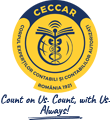For authors » Ethics
Ethics
Publication Ethics and Standards for Editors / Authors
Publication Ethics: The CECCAR Business Review is committed to endorse the highest standards of journal publication ethics. The CECCAR Business Review follow the “International standards for editors and authors ” developed by the Committee of Publication Ethics (COPE) during the 2nd World Conference on Research Integrity in Singapore in 2010 and The European Code of Conduct for Research Integrity, provided by the European Federation of Academies of Sciences and Humanities (ALLEA).
International Standards for Editors - Summary (Kleinert S & Wager E (2011) Responsible research publication: international standards for editors. A position statement developed at the 2nd World Conference on Research Integrity, Singapore, July 22-24, 2010. Chapter 51 in: Mayer T & Steneck N (eds) Promoting Research Integrity in a Global Environment. Imperial College Press / World Scientific Publishing, Singapore (pp 317-28). (ISBN 978-981-4340-97-7)): Editors are accountable and should take responsibility for everything they publish. Editors should make fair and unbiased decisions independent from commercial consideration and ensure a fair and appropriate peer review process. Editors should adopt editorial policies that encourage maximum transparency and complete, honest reporting. Editors should guard the integrity of the published record by issuing corrections and retractions when needed and pursuing suspected or alleged research and publication misconduct. Editors should pursue reviewer and editorial misconduct. Editors should critically assess the ethical conduct of studies in humans and animals. Peer reviewers and authors should be told what is expected of them. Editors should have appropriate policies in place for handling editorial conflicts of interest.
International Standards for Authors - Summary (Wager E & Kleinert S (2011) Responsible research publication: international standards for authors. A position statement developed at the 2nd World Conference on Research Integrity, Singapore, July 22-24, 2010. Chapter 50 in: Mayer T & Steneck N (eds) Promoting Research Integrity in a Global Environment. Imperial College Press / World Scientific Publishing, Singapore (pp 309-16). (ISBN 978-981-4340-97-7)): The research being reported should have been conducted in an ethical and responsible manner and should comply with all relevant legislation. Researchers should present their results clearly, honestly, and without fabrication, falsification or inappropriate data manipulation. Researchers should strive to describe their methods clearly and unambiguously so that their findings can be confirmed by others. Researchers should adhere to publication requirements that submitted work is original, is not plagiarised, and has not been published elsewhere. Authors should take collective responsibility for submitted and published work. The authorship of research publications should accurately reflect individuals’ contributions to the work and its reporting. Funding sources and relevant conflicts of interest should be disclosed.
The major ethical issues that an author should be aware off
Authorship
Every author named on a journal article should have made a significant contribution to a journal article. This means that as an author or co-author you made a significant contribution in the research conception or design, acquisition of data, analysis and interpretation of data, and have drafted, written, or revised the article. Also, you are aware that all named co-authors share responsibility and accountability for the content of the article including the case in which the article is found to be unsafe, in error, in some way fraudulent, or in breach of the publishing agreement.
It should be avoided gift (guest) authorship: where someone is added to the list of authors who has not been involved in writing the paper and ghost authorship: where someone has been involved in writing the paper but is not included in the list of authors.
The affiliation(s) of the author(s), i.e. institution, (department), city, (state), country should be the institution where you conducted the research. For authors that are unaffiliated we will only capture their city and country of residence. If this is the case, then it should also include details of any funding received from that institution.
The practical advice on addressing the most common ethical issues in this area can be found in Discussion Document: Authorship – produced by COPE.
Plagiarism
COPE defines plagiarism as follow - “When somebody presents the work of others (data, words or theories) as if they were his/her own and without proper acknowledgment.”
To avoid infractions by plagiarism or self-plagiarism CECCAR Business Review uses CrossCheck to screen for unoriginal material. Authors submitting articles to journal should be aware that their paper may be submitted to CrossCheck during the peer-review or production process.
If you are discussing one particular source at different points in your paper, make sure you correctly cite every instance. Therefore, if you’re discussing your own previous work, make sure you cite it.
When citing others’ (or your own) previous work, please ensure you have:
- Clearly marked quoted verbatim text from another source with quotation marks.
- Attributed and referenced the source of the quotation clearly within the text and in the Reference section.
- Obtained permission from the original publisher and rightsholder when using previously published figures or tables.
Data fabrication / falsification
All data should be accurate, and representative for the research. CECCAR Business Review may ask authors to provide supporting raw data where required. Cases of possible data fabrication/falsification will be evaluated by the editor of the journal during the peer-review or production process.
Conflicts of interest/ Competing interests
A conflict of interest (COI) can occur when a person or organization is involved in multiple interests, such as financial or nonfinancial, professional, or personal, which could interfere with, or could reasonably be perceived as interfering with conducting the research in an ethical and responsible manner.
Further reading: Conflicts of interest/ Competing produced by COPE.







